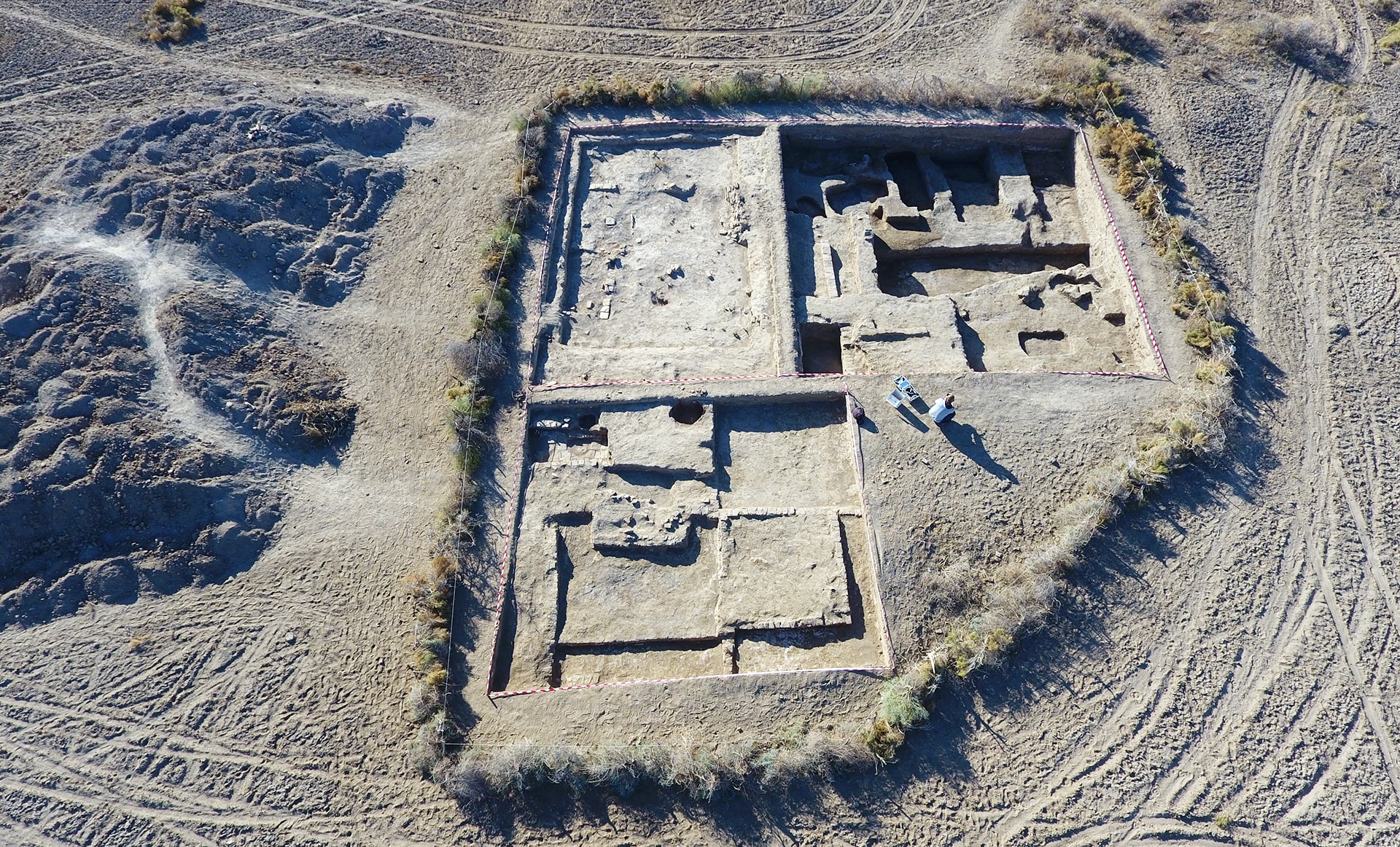Unique golden items from ancient Kultobe were transferred to the museum-reserve “Azret Sultan”
At the initiative of the Ministry of Culture and Sports of the Republic of Kazakhstan, the Kazakh Research Institute of Culture is conducting archaeological excavations at the medieval settlement of Kultobe. The unique artifacts discovered up to this moment are now presented to the general public in the fund of the historical and cultural museum-reserve “Azret Sultan”. This collection includes about 600 items. Among them are 193 ceramic items dated to the XVII-XIX centuries, 77 copper items, 298 coins of the XVIII-XIX centuries, 17 fragments of porcelain dishes, 6 pieces of gold jewelry belonging to the second half of the II century-IV century, 2 gold earrings of the XIII-XIV centuries, 7 fragments of gold items, as well as 9 silver coins and 2 pieces of silver jewelry.
Among the finds are gold items found in the oldest construction layer: earrings and jewelry for clothing. They date back to the II-IV centuries AD.
Gold earrings are made of thin gold foil; the jewelry is curved and decorated in a shape of a garnet. The oldest and most interesting item, earrings in a shape of a “roll”, is made in a polychrome style. Similar earrings in the southern region were found in a burial structure in the catacombs of the Kultobe mound in the Ordabasy district. Nowhere else have such decorations been found in our region.
“As a rule, gold jewelry is found not in the city itself, but in the boundary hills. This is the peculiarity of a rare artifact found on Kultobe. In the Saka period, the pattern of making these ornaments was different. At that time, it was not customary to decorate jewelry with additional stones. These earrings belong to the periods of the Huns and Sarmatians, that is, to the II-III centuries. Each artifact gives us information about the traditions and customs, the way of life of our ancestors,” says Doctor of Historical Sciences, archaeologist Mukhtar Kozha.
Along with this, archaeologists also found earrings in a shape of a question mark, decorated with pearls and dating back to the XII-XIII centuries.
“Such earrings were discovered in 2000 during excavations at the Sauran settlement and transferred to the fund. Scientists call such earrings “Kipchak” and believe that they were worn by the common people, not representatives of authority. The second decoration is in the form of the number eight and made of thin wire. On the other side, 4 small pearls are strung on a thin wire. Gold jewelry dating back to the II-III centuries, as indicated in the program article of Elbasy N. A. Nazarbayev “Seven Facets of the Great Steppe”, proves that the Kazakh land was rich in various metals from ancient times and was the center where metallurgy first began to develop and our craftsmen perfectly mastered the art of making various jewelry,” says N. Ashirbayeva, the head of the storage fund of the state Historical and Cultural Museum-Reserve “Azret Sultan”.
It should be noted that archaeological excavations at the initiative of the Ministry of Culture and Sports of the Republic of Kazakhstan by the Kazakh Research Institute of Culture on the Kultobe settlement with the aim of its restoration have been conducted since 2018.
As a result of continuous archaeological work, researchers discovered places of dwellings of the eras of the Kokand rule and the Kazakh Khanate, ceramic jars of the XVII-XIX centuries and other valuable artifacts.
As part of the restoration and archaeological works planned for 2019-2021, work was carried out on the construction of walls with the preservation of the original appearance and the construction of gallery roads so that tourists can get acquainted with the object.
Within the framework of the project, implemented on the initiative of the Ministry of Culture and Sports of the Republic of Kazakhstan, archaeological excavations, complex restoration works, and partial restoration are being carried out at the Kultobe settlement, which is under the jurisdiction of the State Historical and Cultural Museum-reserve “Azret Sultan”.
It is also planned to study the unsolved mysteries of the Kultobe settlement, and prepare a scientific concept for the protection and restoration of significant historical sites in the Kultobe settlement, along with building an archaeological park on the recommendation of UNESCO and the international expert association ICOMOS. There are also plans to develop 3D models of artisans' workshops, houses, prayer rooms and other objects. Moreover, specialists will prepare and publish monographs, scientific collections devoted to the study of the Kultobe settlement in such aspects as archeology, ethnography, cultural studies and art history, illustration albums and a number of scientific articles.






